Real estate is a cornerstone of wealth-building strategies, but growing a portfolio often requires more than just capital. You need expertise, creativity, and strategic planning to navigate complex markets and maximize your returns. This often has to come from years, if not decades, of experience in real estate investment. If you’re inexperienced, it can seem beneficial to partner with a professional real estate entrepreneur who can guide you through the process.
At Defy Mortgage, we have years of experience in providing various investment property loans to entrepreneurs, freelancers, and real estate investors in the US. Whether you’re looking to expand your portfolio quickly with a series of DSCR loans or enter the US real estate market as a foreign national, we can customize each of our 75+ non-traditional options to fit your needs. Our commitment ensures a transparent, stress-free experience for all homeowners.
In this blog, we’ll explore whether working with a real estate entrepreneur as a real estate investment partner is the right move for you. We’ll analyze the advantages and drawbacks you need to consider before going through with a partnership and give you tips on how to effectively structure it.
Who Is a Real Estate Entrepreneur and What Do They Do?
A real estate entrepreneur is someone whose main line of work is in identifying and managing profitable property investments. This can be their primary job or something they do part-time for supplemental income. Their primary focus is helping you create wealth through strategic property acquisitions, developments, and portfolio management. They often specialize in identifying lucrative properties, negotiating deals, and implementing strategies to maximize returns–whether for themselves or others looking to invest in real estate.
Their expertise spans several key functions including but not limited to:
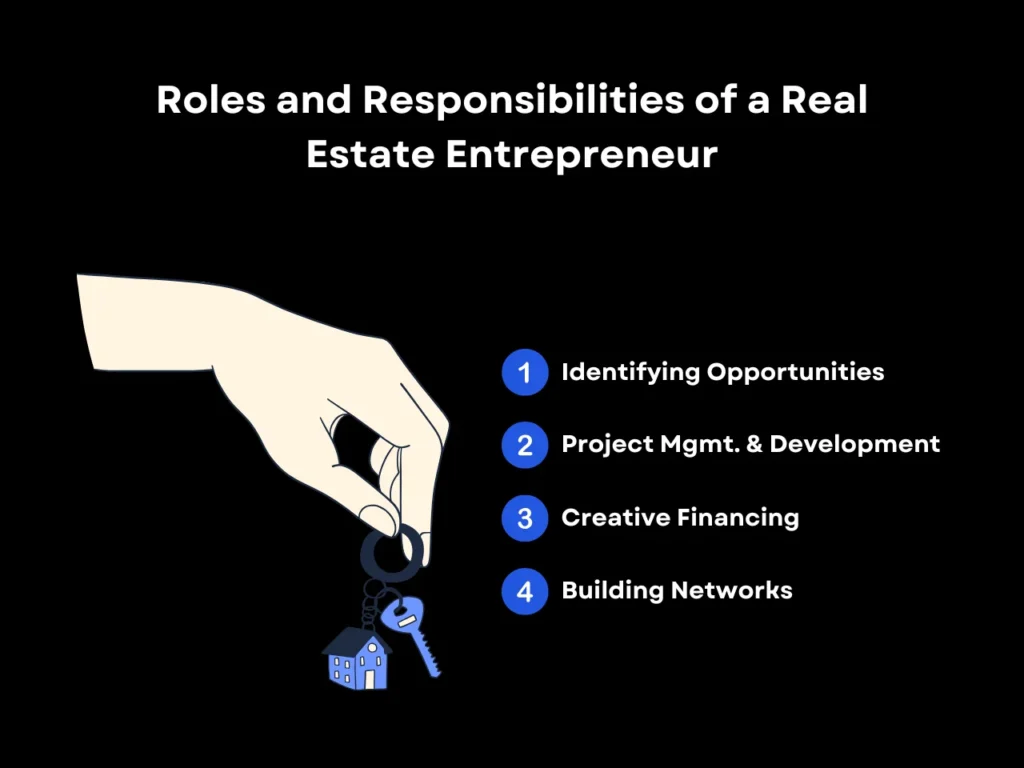
- Identifying Opportunities: Real estate entrepreneurs are experienced in spotting undervalued properties. This requires conducting in-depth market research and leveraging tools and networks to identify properties with strong potential for appreciation or cash flow.
- Project Management and Development: Many real estate entrepreneurs play an active role in property development, overseeing renovations, construction, property repositioning, as well as acquisition. Their hands-on involvement helps them gain reliable information about every stage of the process.
- Creative Financing: Many entrepreneurs, particularly self-employed ones, often employ innovative financing methods to compensate for their lack of liquidity or traditional tax returns. These can include partnerships, joint ventures, non-QM lending options, or leveraging rental income toward loan qualification to qualify for a home loan for an investment property.
- Building Networks: Successful entrepreneurs come with robust networks of brokers, contractors, property managers, and financiers. These relationships can help you save time and cost as you build up your own portfolio from the ground up.
Benefits of Partnering with a Real Estate Entrepreneur
Teaming up with an experienced professional real estate entrepreneur can give you several advantages. Successful real estate investors, regardless of experience level, often partner with real estate entrepreneurs for these reasons:
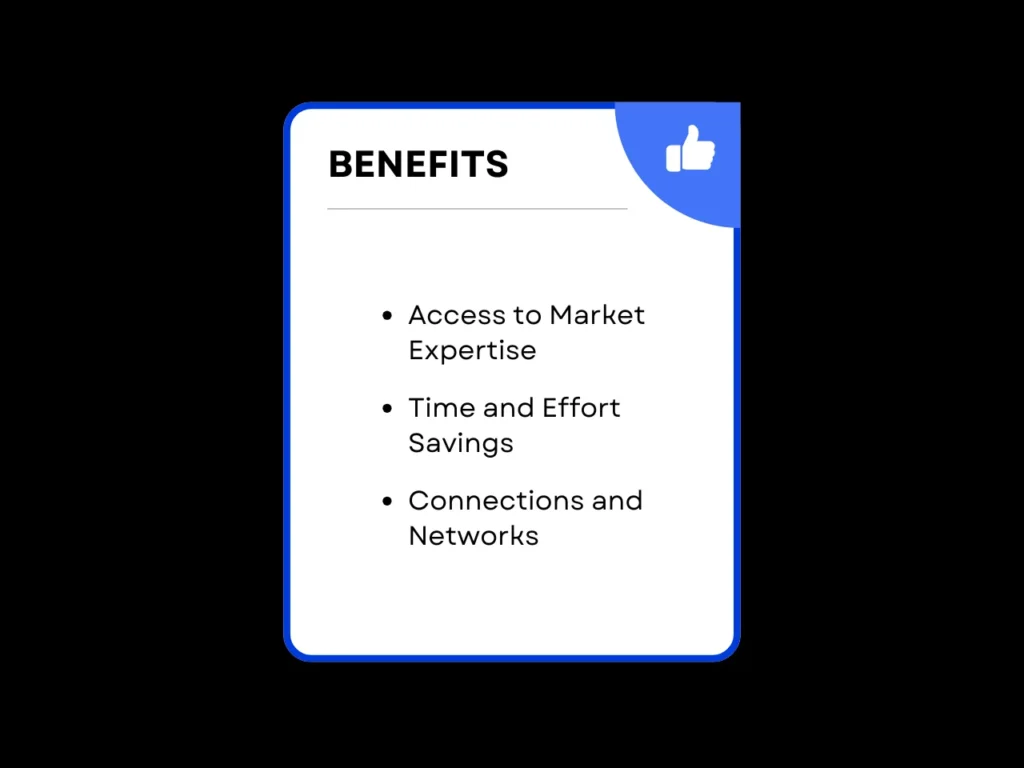
Access to Market Expertise
A real estate entrepreneur brings in-depth knowledge of market trends, helping investors identify high-yield opportunities. Their expertise allows for precise market analysis, uncovering prospects others might overlook, such as emerging neighborhoods, low-value assets that can yield excellent returns once renovated, or areas primed for rental income growth.
Time and Effort Savings
Managing real estate investments can be an exhaustive process, requiring a lot of time to research properties, conduct due diligence, negotiate, and oversee construction projects. Partnering with a seasoned entrepreneur can alleviate some of this burden.
Depending on how you’ve worked out your agreement, your real estate entrepreneur partner can fully shoulder the more complex tasks or even handle your end of the investment partnership entirely, either for a fee or equity.
Scalability and Financial Benefits
The systems, processes, and networks that entrepreneurs have built enable faster scaling of real estate operations. Their ability to manage multiple projects simultaneously and their understanding of how to grow efficiently can help accelerate portfolio expansion.
When it comes to financial benefits, strong real estate entrepreneurs bring capital efficiency through their established networks of lenders, investors, and industry relationships. They often have access to better financing terms and can structure creative deals that maximize returns while managing risk. Their track record may also help secure funding at more favorable rates.
Connections and Networks
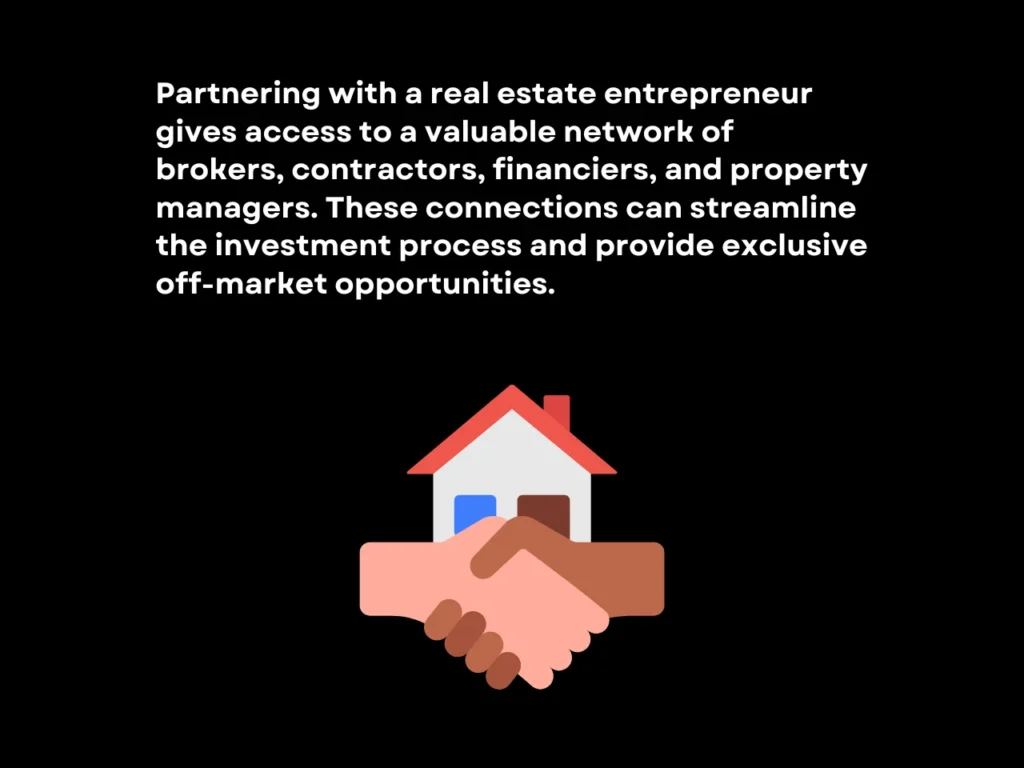
One of the most significant advantages of partnering with a real estate entrepreneur is gaining access to their extensive network of industry professionals. These connections often include local brokers, contractors, financiers, and property managers.
Leveraging these relationships can streamline every stage of the investment process—from finding the right property to securing favorable financing terms.
Drawbacks to Consider When Working with a Real Estate Entrepreneur
Though it can be a good idea to partner with a professional real estate entrepreneur due to the numerous benefits, some may find it better to simply go at it alone. Here are some caveats when planning out your investment strategy with a real estate entrepreneur as a partner:
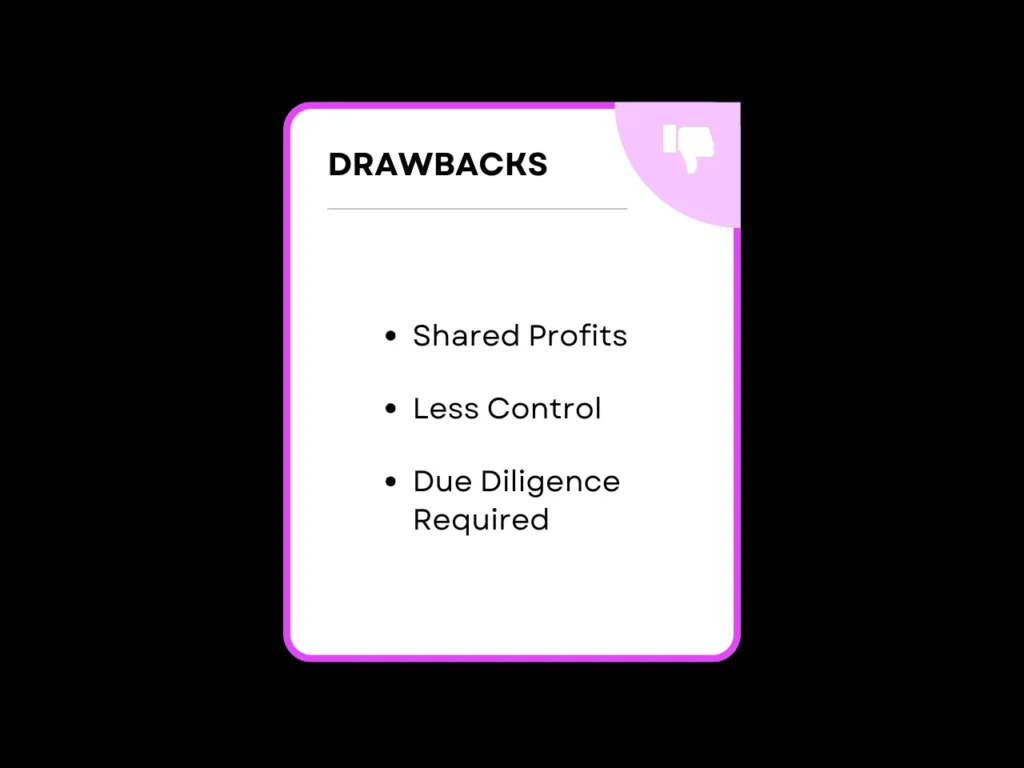
Shared Profits
One of the primary drawbacks of partnering with a real estate entrepreneur is the need to share profits. While their expertise, network, and knowledge of local housing markets can significantly enhance the investment’s success, the profit split might reduce your overall returns. Investors must weigh the value added by the entrepreneur against the portion of earnings they will forgo to determine if the partnership is worth the trade-off.
Less Control
Collaborating with a real estate entrepreneur often means relinquishing some decision-making authority. Entrepreneurs typically bring their own strategies, methods, and preferences to the table, which might differ from the investor’s vision.
This aspect of the partnership could be a challenging adjustment for individuals who prefer direct control over their investments. It’s essential to ensure that both parties share a common approach and mutual respect for one another’s input.
Due Diligence Required
Finding the right entrepreneur to partner with demands time and careful evaluation. Investors must thoroughly vet potential partners, assessing their track record, reputation, and alignment with the investor’s goals and risk tolerance.
This due diligence process can be labor-intensive, but it is crucial to mitigate risks and establish a foundation for a successful partnership. A poorly chosen partner could lead to financial losses or mismatched expectations.
Structuring Partnerships Effectively
A real estate entrepreneur often works with investors through structured partnerships. Partnerships allow both parties to pool resources, share risks, and leverage combined expertise for better outcomes.
When entering a partnership with a real estate entrepreneur, it is essential to establish a clear and mutually beneficial structure. Successful partnerships are built on transparency, trust, and well-defined roles. You should consider the following when entering into the real estate business with a partner:
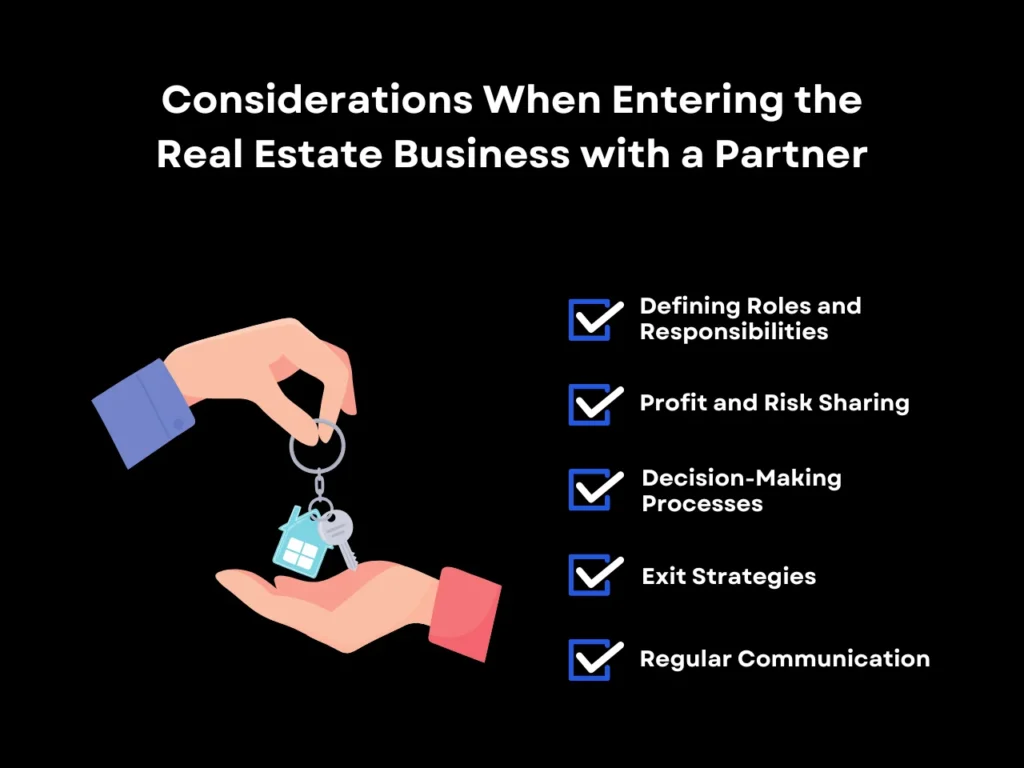
- Defining Roles and Responsibilities: Clearly outline each partner’s contributions, whether financial, managerial, or operational. This ensures accountability and prevents misunderstandings.
- Profit and Risk Sharing: Decide on a fair distribution of profits and risks. This can include agreements on profit splits, equity stakes, or cost-sharing mechanisms to align incentives.
- Values and Goals Alignment: Ensure partners share similar investment philosophies, risk tolerances, and time horizons. Discuss target returns, hold periods, leverage policies, and overall portfolio strategy. Misalignment in these areas often leads to conflict which will need to be quickly resolved.
- Decision-Making Processes: Establish how decisions will be made, including conflict resolution strategies. Defining whether decisions require unanimous approval or majority rule can streamline operations.
- Exit Strategies: Agree on terms for dissolving the partnership or selling assets if goals change or unforeseen circumstances arise. A well-documented exit strategy protects both parties and minimizes potential conflicts.
- Regular Communication: Maintain open lines of communication to ensure both parties remain aligned on goals, timelines, and any adjustments needed. Regular updates and meetings foster trust and adaptability.
Detailed partnership structuring upfront can benefit both the investor and the entrepreneur, setting the right expectations for both sides.
Real Estate Entrepreneur FAQ
How does a real estate entrepreneur differ from a property manager?
A real estate entrepreneur focuses on strategic investments and portfolio growth, identifying high-yield opportunities and optimizing returns. In contrast, property management involves handling the day-to-day operations of rental properties, such as tenant relations, maintenance, and rent collection. Essentially, entrepreneurs drive investment success, while property managers ensure smooth operational performance.
Can a real estate entrepreneur help if I have limited investment capital?
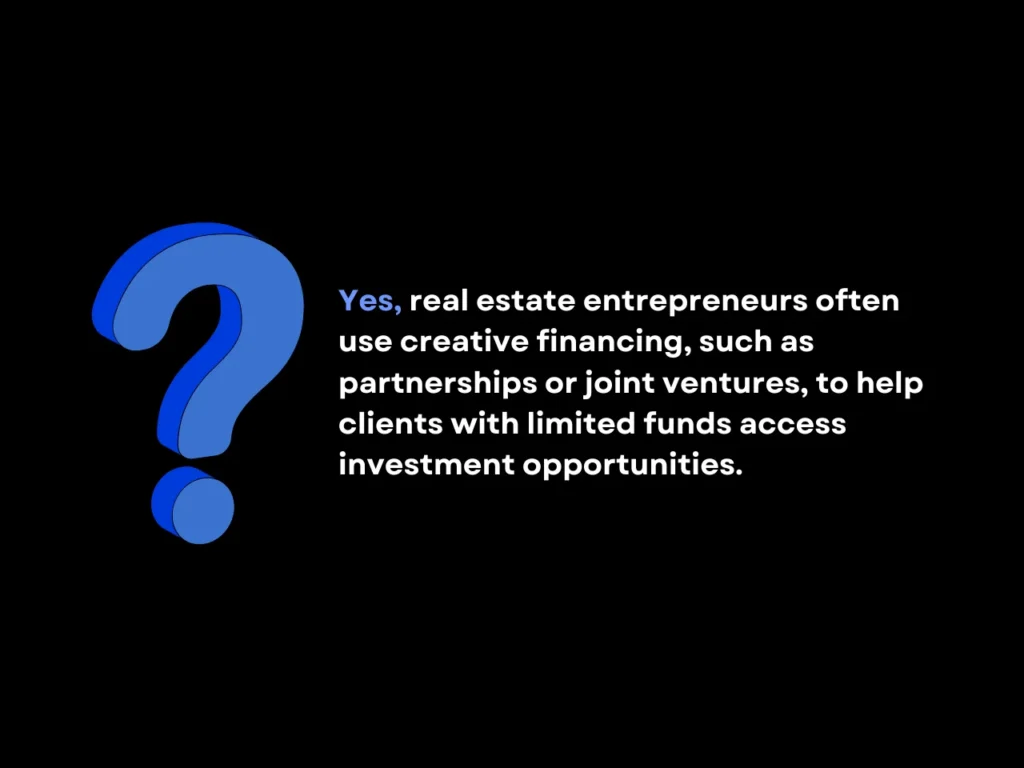
Yes, many real estate entrepreneurs specialize in forming partnerships, engaging in joint ventures, or leveraging creative financing options to maximize investment potential despite limited funds. Creative financing with non-QM loans is especially beneficial for this purpose, since they often require no tax returns or W-2s to prove borrower income. Instead, they rely on alternative metrics such as bank statements or rental income, making them well-suited even for foreign nationals without a US Social Security number or FICO score.
What types of properties do they typically focus on?
Real estate entrepreneurs are not typically limited to a certain type of property. Rather, they work across a wide range of asset classes, including residential, commercial, industrial, and mixed-use properties. Their focus often depends on current market opportunities and trends, allowing them to adapt strategies to areas with the highest growth potential.
How do real estate entrepreneurs make money?
Real estate entrepreneurs earn income through various channels, such as profit-sharing agreements, management fees, and capital appreciation from successful investments. Some may also charge consulting fees or take equity stakes in projects they oversee, aligning their success with the profitability of the investments.
Do I need to work with a real estate entrepreneur to explore my mortgage options?
No, you don’t need to work with a real estate entrepreneur to explore your mortgage options. Many investors choose to work directly with mortgage professionals, like those at Defy, to identify the best financing solutions for their investment goals. At Defy, our team can guide you through the process, offering personalized advice and support to ensure you find the mortgage that aligns with your strategy.
Key Takeaway
Partnering with a real estate entrepreneur offers certain advantages, including market expertise, time savings, and strategic portfolio growth. However, it’s essential to weigh these benefits against potential drawbacks like shared profits and reduced control.
It’s worth noting that you don’t necessarily need to give away profits to achieve your investment goals. At Defy Mortgage, we can walk you through the home loan process and help you identify the best financing options to maintain full ownership and control of your investments.
Ready to break into the world of real estate investment? Book a call with Defy Mortgage today or give us a call at (615) 622-1032. Let’s help you achieve your real estate investment goals – or whatever homeownership goals you may have, with confidence!




